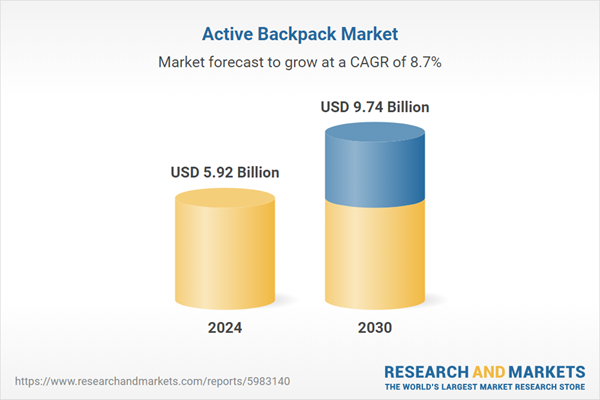Hiking/Trekking is the fastest growing segment, North America is the largest market globally
Speak directly to the analyst to clarify any post sales queries you may have.
10% Free customizationThis report comes with 10% free customization, enabling you to add data that meets your specific business needs.
Key Market Drivers
A significant driving factor for the Global Active Backpack Market is the increasing participation in outdoor and recreational activities worldwide. A growing number of individuals are adopting active lifestyles, seeking physical and mental well-being through pursuits such as hiking, cycling, and trail running. This trend is evident in participation statistics; for example, according to the Outdoor Foundation and Outdoor Industry Association, in June 2024, their 2024 Outdoor Participation Trends Report revealed that the female participation rate in outdoor recreation reached 51.9% in the United States in 2023. This heightened engagement directly translates into a greater demand for specialized active backpacks that offer comfort, durability, and functionality tailored to diverse activities.Key Market Challenges
The intense competition among manufacturers poses a significant challenge to the growth of the Global Active Backpack Market. This competitive pressure frequently leads to price erosion as brands strive to gain or maintain market share, directly impacting profit margins for companies operating within this sector. Such reduced profitability subsequently limits the financial capacity for critical investments in research and development, which are essential for enhancing product innovation, material science, and ergonomic designs in active backpacks. The consequence is a potential slowdown in the introduction of new features and advancements that could otherwise attract consumers and expand the market's value.Key Market Trends
Growing Integration of Smart Technology and Connectivity Features represents a significant evolution in active backpacks, moving beyond traditional utility to offer enhanced convenience, security, and multi-functionality. These innovations include GPS tracking for location awareness, integrated charging capabilities for electronic devices, Bluetooth connectivity for audio or smart device interaction, and advanced anti-theft measures. This trend caters to consumers who require their gear to support an increasingly connected and mobile lifestyle, whether for urban commuting or outdoor adventures. Targus, a mobile computing accessories company, launched the Cypress Hero backpack with Find My Location in June 2023, showcasing the integration of sophisticated tracking technology to address security concerns.Key Market Players Profiled:
- Deuter Sport GmbH
- Samsonite IP Holdings S.a.r.l.
- Amer Sports Corporation
- Vista Outdoor Inc.
- VF Corporation
- Patagonia, Inc.
- Columbia Sportswear Company
- American Recreation Products, Inc. (Kelty)
- Osprey Packs, Inc.
- C.C. Filson Company, Inc. (Filson)
Report Scope:
In this report, the Global Active Backpack Market has been segmented into the following categories:By Type:
- Hiking/Trekking
- Camping & Travelling
- Sports
- Others
By Size:
- Less Than 10L
- 10L-20L
- 20L-40L
By Sales Channel:
- Hypermarkets/Supermarkets
- Specialty Stores
- Online
- Others
By Region:
- North America
- Europe
- Asia Pacific
- South America
- Middle East & Africa
Competitive Landscape
Company Profiles: Detailed analysis of the major companies present in the Global Active Backpack Market.Available Customizations:
With the given market data, the publisher offers customizations according to a company's specific needs. The following customization options are available for the report:- Detailed analysis and profiling of additional market players (up to five).
This product will be delivered within 1-3 business days.
Table of Contents
Companies Mentioned
- Deuter Sport GmbH
- Samsonite IP Holdings S.a.r.l.
- Amer Sports Corporation
- Vista Outdoor Inc.
- VF Corporation
- Patagonia, Inc.
- Columbia Sportswear Company
- American Recreation Products, Inc. (Kelty)
- Osprey Packs, Inc.
- C.C. Filson Company, Inc. (Filson)
Table Information
| Report Attribute | Details |
|---|---|
| No. of Pages | 182 |
| Published | November 2025 |
| Forecast Period | 2024 - 2030 |
| Estimated Market Value ( USD | $ 5.92 Billion |
| Forecasted Market Value ( USD | $ 9.74 Billion |
| Compound Annual Growth Rate | 8.6% |
| Regions Covered | Global |
| No. of Companies Mentioned | 10 |









